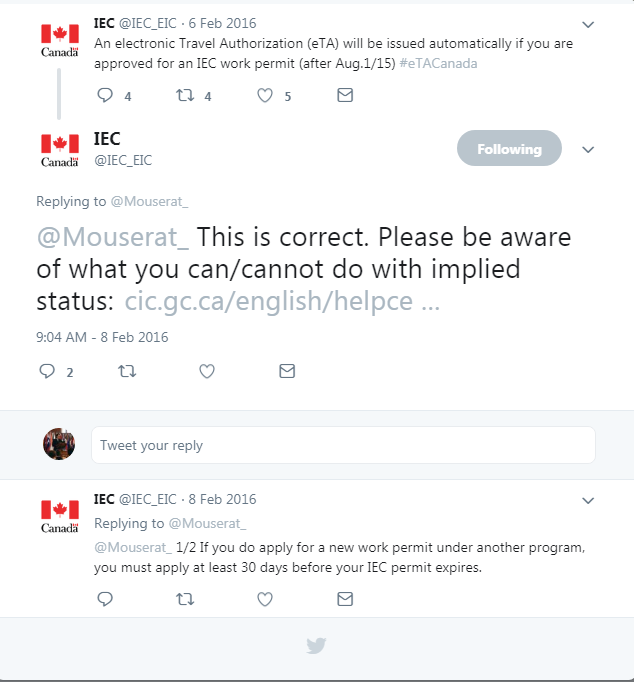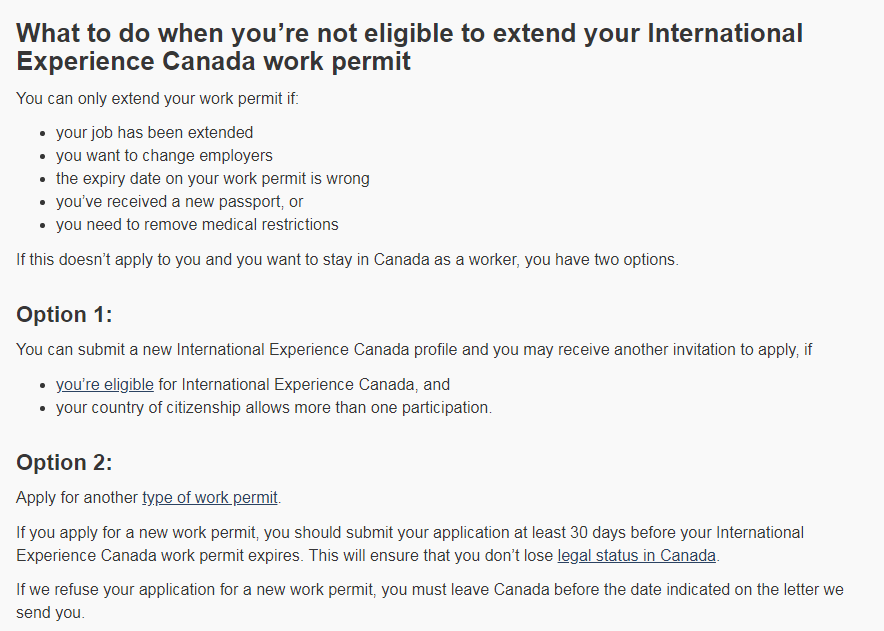Clarification Needed: Why the IEC Work Permit and Implied Status Problem Needs Fixing
Other than the permanent resident delay problem, the surprising #2 line up outside my door question this late spring/early summer has been about International Experience Canada (“IEC”) Work Permit Extensions. Several individuals hold IECs and are now asking about obtaining Bridging Open Work Permits and Spousal Open Work Permits, hoping to rely on implied status to transition from to the other.
This Moving 2 Canada post (I am not sure if they are qualified immigration consultants or not so I will just throw up big disclaimers here) captures well the uncertainty, confusion, and problem with how the law/regs often interfere with policy.
Source: https://moving2canada.com/iec-implied-status/
I also found other examples of where IEC’s FB appears to condone implied status with the arbitrary 30 days before expiry rule – that also isn’t a “must” under law (?).
Even as late as earlier this week I had an individual walk in my door stating that the call centre agent was adamant that they could not extend an IEC work permit/seek implied status.
IRCC’s website doesn’t provide a clear cut answer either but leans towards the possibility of protecting your legal status by extending to another work permit:
Legally – No barrier to IEC Implied Status
Here is the scene: Canada has signed several agreements with countries and organizations under the #IEC. Under these agreements, there are written in rules that limit the duration of stay to no more than 12 months. This extract is from our Youth Mobility Agreement with Slovakia.
Source: http://www.treaty-accord.gc.ca/text-texte.aspx?id=105237
However the relevant regulation, R.186(u) of the Immigration and Refugee Protection Regulations does not provide any qualifications on implied status or working on implied status:
No permit required
186 A foreign national may work in Canada without a work permit
……
(u) until a decision is made on an application made by them under subsection 201(1), if they have remained in Canada after the expiry of their work permit and they have continued to comply with the conditions set out on the expired work permit, other than the expiry date;
Regulation 201 states:
Application for renewal
In short, other than the international commitments made to other countries through these youth agreements, there is nothing in IRPR stopping implied status UNLESS someone it was made a condition of the work permit that it was not extendable (#IRCC, please don’t get ideas). It seems to be a Government website wanting to not advertise it as an option in light of it’s other written commitments.
So far I’ve run into no push back but if there are cases of refusals, I query…..
- Will this implied status period count towards permanent residency work experience?
- Can someone be removed from Canada per s.41, s.29(2) for working on implied status?
Remember – implied status does not work the other way (for certain!). An IEC work permit is an application made outside Canada and therefore you need to physically obtain a WP approval letter before heading to the Port of Entry and/or applying at a foreign visa post!
IRCC could use some clarifying policy on this! Applicants are getting confused.
Canada’s Minor Children Custodianship Crisis – IRCC Needs to Step In
I read a recent piece quoting my mentor Richard Kurland and his prediction of Canada’s Express Entry system being flooded by international students who come to Canada in their K-12 years. In it, he predicted that they will then go on to attend college and university and are therefore will very qualified and achieve high eligibility under our existing permanent residency rules.
Clearly there is a bottleneck issue that must be addressed sooner rather than later to ensure that there is not a challenge with these graduates in the job market and later applying for permanent residency. This could put additional strain on our humanitarian and compassionate grounds – permanent resident stream as well, if not properly navigated.
I wanted to focus on a related spin-off issue involving minor children. This piece is on a practice that has come to my attention recently that IRCC needs to urgently investigate and with priority.
Currently, there is a major trend of global educational consultants and families working directly with public and private K-12 institutions to facilitate study permits for minor students whose parents do not accompany them or accompany them as a visitor (i.e. without work permit/student status themselves). In these cases, a custodianship form – IMM 5646E is required. They need a custodian in order to study in Canada.
The Problem with Custodianship in Immigration
Custodianship is defined by IRCC as follows:
“A custodian is a responsible adult (Canadian citizen or a permanent resident) who takes care of and supports the child.”
The problem with this term is it is a Canadian immigration definition, not grounded in family law and the more significant and onerous term “guardianship” and thus creates a major knowledge gap in what the custodian can and cannot do, and the minor children (and their parent’s) ability to intercept. What happens also when a custodian is unable to fulfill their duties or a student needs to switch custodians. Are there any legal requirements other than PR/Citizenship to become a custodian?
Where this becomes particularly problematic is in the environment now where you have schools and their administrators/staff/teachers/related agent parties serving as said custodian. Indeed, recently I learned of individuals being custodians over 300 students at some elementary/secondary schools. To me, this is a recipe for disaster. Putting one individual in charge of over 300 students for their “care and support” in any context does not make practical sense and opens up a whole can of legal worms.
Worse yet is the relationship between the agent and the school or the staff and the school. Should the minor child (let us use the example of a high school student) have a conflict with the school – for example academic challenges, breach of school rules, etc., there is arguably no incentive to seek any care and support for the child .
In fact likely an incentive to seek the student’s immediate return to their home country. Adding to the fact there are major barriers to language and communication between parents and the minor student – often times beyond the abilities of the custodians, it is unclear how these disputes are to be resolved.
I was recently contacted on a case where the custodian (rep from school) was prepared to drive the child to the airport to facilitate their return from Canada, without their parent or the minor’s permission. They allegedly prevented the student from obtaining a phone and created other restrictive barriers – all, likely, for the interest of likely protecting the school rather than the student.
Minor children should not be the poker chips in the process. It is not clearly transparent what limits there are on custodians receiving fees from minor children and their families and limits of what they can and cannot do with respect to the security of the child.
What can IRCC do? I have a few suggestions:
- Clearly define custodianship vis-a-vis family law definitions of guardianships and require more than a two page signed form in English to formalize this agreement;
- Clearly set a limit on how many students one custodian can be responsible for the care and support of;
- Set an obligation for full disclosure to the parent/child where there is a existing relationship with the educational institution OR ELSE bar individuals with said relationships from acting as custodians.
- Consult with experts in the field such as Justice for Youth and Children (http://jfcy.org/en/);
- Ultimately create a set of much more detailed guidelines setting out where additional fees can be charged, the rights of the child, etc.
I hope this issue can be solved before it becomes worse. With the numbers of minor students coming to Canada without parents seeking study permits, I do worry that it may only get worse before it gets better unless urgent steps are taken now.
With the more restrictive issuance of study permits at a post-secondary level and the penultimate demand for minor student study permits – now would be a great time for IRCC to proactively tighten the rules and clarify the policy.



